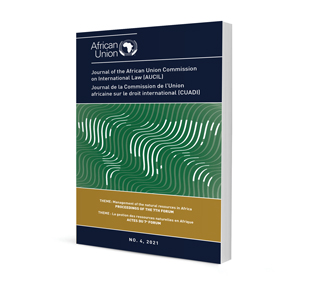
Resource curse and impunity gaps: National inadequacies, international responses and regional promises / Malédiction des ressources et impunité: Insuffisances nationales, réponses internationales et promesses régionales
Author: Ebele Angela Onyeabo
ISSN: 1821-8962
Affiliations: LL B (Hons), PhD candidate and affiliate of the Centre for Comparative and Transnational Law (CCLT), Faculty of Law, Chinese University of Hong Kong.
Source: Journal of the African Union Commission on International Law 2021, p. 269-307
https://doi.org/10.47348/AUCIL/2021/a8
Abstract
Kleptocracy has been a constant feature in Africa. The fallout of this relentless pursuit for state funds continues to threaten not only the economy, but also the security and stability of the region. Limited domestic judicial accountability for ‘grand corruption’ has exacerbated this problem, rendering both United Nations (UN) and African Union (AU) anti-corruption conventions ineffective. As a possible solution, the AU has adopted the Malabo Protocol, which creates a criminal chamber or a Regional Criminal Court (RCC) within the newly formed African Court of Justice and Human Rights (ACJHR), that merges the already existing AU courts. This represents the first supranational institution to tackle ‘grand corruption’ as defined in art 28I of the Protocol. This paper discusses the link between corruption, the ‘resource curse’ and regional security. It evaluates the efficacy of art 28I of the Protocol within the context of other mechanisms developed to address grand corruption globally, like transparency initiatives and the exercise of jurisdictional sovereignty over transnational crimes. The paper comments on the possible relationship between the International Criminal Court (ICC) and the RCC and proposes steps that the RCC could take to overcome anticipated challenges.
La kleptocracie est une caractéristique constante en Afrique. Les retombées de cet engouement effréné pour vider les caisses de l’État sont une menace non seulement pour l’économie, mais aussi pour la sécurité et stabilité de la région. La responsabilité judiciaire nationale limitée pour les crimes de « grande corruption » ont exacerbé ce problème rendant de ce fait inefficaces les conventions des Nations unies (NU) et l’Union africaine (UA) contre la corruption. Comme solution, l’UA a adopté le protocole de Malabo qui crée une chambre criminelle ou un Tribunal Criminel Régional (TCR) au sein de la Cour africaine de Justice et des Droits de l’Homme (CAJDH) nouvellement créée, qui fusionne les tribunaux déjà existants de l’UA. Ceci représente la première institution supranationale qui tacle la « grande corruption » telle que définit par l’article 281 du Protocole. Cet article examine le lien entre la corruption, la « malédiction des ressources » et la sécurité régionale. Il évalue l’efficacité de l’article 281 du Protocole vis-à-vis d’autre mécanismes développés pour combattre la corruption à l’échelon mondial tels que les initiatives de transparence et l’exercice de la souveraineté juridictionnelle sur les crimes transnationaux. Cet article commente sur la possibilité d’une relation entre la Cour pénale internationale (CPI) et le TCR et propose des mesures que le TCR pourrait prendre afin de pallier aux problèmes éventuels.